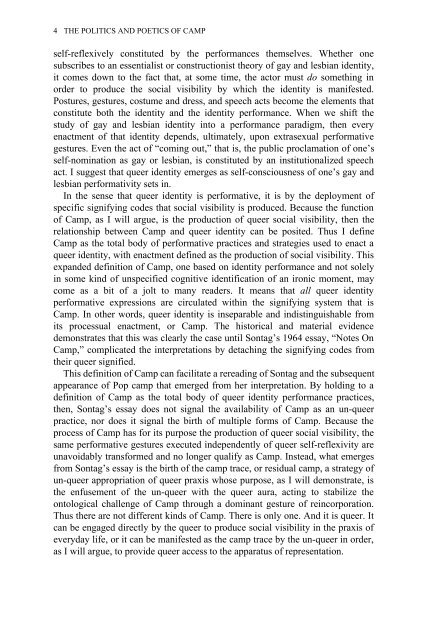Edited by Moe Meyer - Get a Free Blog
Edited by Moe Meyer - Get a Free Blog
Edited by Moe Meyer - Get a Free Blog
Create successful ePaper yourself
Turn your PDF publications into a flip-book with our unique Google optimized e-Paper software.
4 THE POLITICS AND POETICS OF CAMP<br />
self-reflexively constituted <strong>by</strong> the performances themselves. Whether one<br />
subscribes to an essentialist or constructionist theory of gay and lesbian identity,<br />
it comes down to the fact that, at some time, the actor must do something in<br />
order to produce the social visibility <strong>by</strong> which the identity is manifested.<br />
Postures, gestures, costume and dress, and speech acts become the elements that<br />
constitute both the identity and the identity performance. When we shift the<br />
study of gay and lesbian identity into a performance paradigm, then every<br />
enactment of that identity depends, ultimately, upon extrasexual performative<br />
gestures. Even the act of “coming out,” that is, the public proclamation of one’s<br />
self-nomination as gay or lesbian, is constituted <strong>by</strong> an institutionalized speech<br />
act. I suggest that queer identity emerges as self-consciousness of one’s gay and<br />
lesbian performativity sets in.<br />
In the sense that queer identity is performative, it is <strong>by</strong> the deployment of<br />
specific signifying codes that social visibility is produced. Because the function<br />
of Camp, as I will argue, is the production of queer social visibility, then the<br />
relationship between Camp and queer identity can be posited. Thus I define<br />
Camp as the total body of performative practices and strategies used to enact a<br />
queer identity, with enactment defined as the production of social visibility. This<br />
expanded definition of Camp, one based on identity performance and not solely<br />
in some kind of unspecified cognitive identification of an ironic moment, may<br />
come as a bit of a jolt to many readers. It means that all queer identity<br />
performative expressions are circulated within the signifying system that is<br />
Camp. In other words, queer identity is inseparable and indistinguishable from<br />
its processual enactment, or Camp. The historical and material evidence<br />
demonstrates that this was clearly the case until Sontag’s 1964 essay, “Notes On<br />
Camp,” complicated the interpretations <strong>by</strong> detaching the signifying codes from<br />
their queer signified.<br />
This definition of Camp can facilitate a rereading of Sontag and the subsequent<br />
appearance of Pop camp that emerged from her interpretation. By holding to a<br />
definition of Camp as the total body of queer identity performance practices,<br />
then, Sontag’s essay does not signal the availability of Camp as an un-queer<br />
practice, nor does it signal the birth of multiple forms of Camp. Because the<br />
process of Camp has for its purpose the production of queer social visibility, the<br />
same performative gestures executed independently of queer self-reflexivity are<br />
unavoidably transformed and no longer qualify as Camp. Instead, what emerges<br />
from Sontag’s essay is the birth of the camp trace, or residual camp, a strategy of<br />
un-queer appropriation of queer praxis whose purpose, as I will demonstrate, is<br />
the enfusement of the un-queer with the queer aura, acting to stabilize the<br />
ontological challenge of Camp through a dominant gesture of reincorporation.<br />
Thus there are not different kinds of Camp. There is only one. And it is queer. It<br />
can be engaged directly <strong>by</strong> the queer to produce social visibility in the praxis of<br />
everyday life, or it can be manifested as the camp trace <strong>by</strong> the un-queer in order,<br />
as I will argue, to provide queer access to the apparatus of representation.


